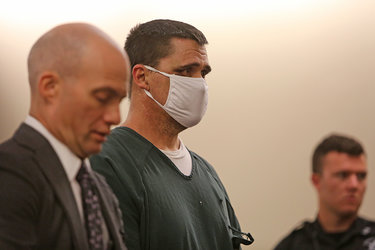Gibson challenges prior felonies, court to hear witnesses in April
ALBANY COUNTY — Andrew R. Gibson, the Westerlo resident who pleaded guilty to aggravated vehicular homicide following a drunk-driving crash that killed Berne resident Lisa Sperry in 2021, is hoping to reduce his sentence by convincing the court that his prior felony convictions are invalid.
The Albany County District Attorney wants to maximize the time Gibson spends in prison by designating him a “persistent felony offender,” which would require the court to sentence him as though his crime were a Class A-I felony — which has a minimum sentencing window of 15 to 25 years and the potential for life imprisonment — as opposed to a Class B felony — the minimum sentence for which, according to state law, “shall be not less than one year nor more than one-third of the maximum term imposed,” with the maximum being 25 years.
Darrell Camp, the spokesman for the district attorney’s office, told The Enterprise this week that securing the designation requires a two-part hearing.
Part one, Camp said, is that the People “have to establish beyond a reasonable doubt that a defendant has 2 or more felony convictions where the defendant was sentenced to more than 1 year of imprisonment, that the sentence did not run concurrently, and that they were committed prior to the present charge for which the sentence is pending.”
The second part involves testimony from witnesses about the offender’s character, Camp said.
Gibson has an extensive criminal history that includes a dramatic stolen-car chase from the city of Schenectady and through the Hilltowns.
In 2004, court records state, he was sentenced to two to four years in prison for third-degree grand larceny following that dramatic episode in which he also attempted to run over an Albany County sheriff’s deputy.
The records also indicate that he had been convicted of third-degree criminal possession of stolen property and two counts of reckless endangerment.
Other records reference the fact that, in 2015, one week before his 36th birthday, Gibson was arrested and later charged with third-degree criminal possession of an assault weapon, fourth-degree criminal possession of stolen property, and fourth-degree criminal possession of a weapon.
Among other things, Gibson’s attorney, Donna Aldea, argued before Judge Andra Ackerman on Feb. 3 that Gibson’s 2004 sentence, which allegedly took into account an earlier felony of his, was procedurally invalid because prosecutors at the time never filed for second felony offender status, rendering the sentence illegal.
Furthermore, she argued, there was no evidence that he signed a waiver of appeal, meaning he was essentially barred from his legal right to an attorney for an appeals process, also rendering the sentence unconstitutional.
Prosecutor Collin D’Arcy argued that, because those issues relate to sentencing and not the conviction, they have no bearing on the count toward designating Gibson a persistent felon.
Aldea also argued that Gibson had pleaded guilty to his weapons-possessions crimes without being advised that such an admission could later be used to increase his sentence for future crimes, and that he had only admitted to possessing two disassembled shotguns but not to knowing that it was illegal for him to possess them.
Prosecutors indicated at the hearing that Gibson’s attorney had not supplied them with reference documents, limiting their ability to reply in depth to those arguments.
Camp told The Enterprise after the hearing, “We can’t really get into the specifics of the arguments and decisions moving forward.”
After the hearing, while attorneys were gathered beyond the bar along with Judge Ackerman, Sperry’s sister, Laura Ingleston, attempted to reach Gibson’s attorney but was stopped by Assistant District Attorney Mary Tanner-Richter, who explained that going beyond the bar was prohibited.
Ingleston and Tanner-Richter had a heated exchange as a bailiff attempted to persuade Ingleston to return to the authorized area.
“We’re doing the best that we can,” Tanner-Richter told Ingleston. “If that’s not good enough for you, I apologize.”
Ingleston, who has been vocal about her frustration with the legal system since the death of her sister, told The Enterprise afterward that she had hoped to ask Aldea why she was “wasting our time” by defending Gibson. Ingleston described Gibson as a “cowardly killer who couldn’t face what he did.”


